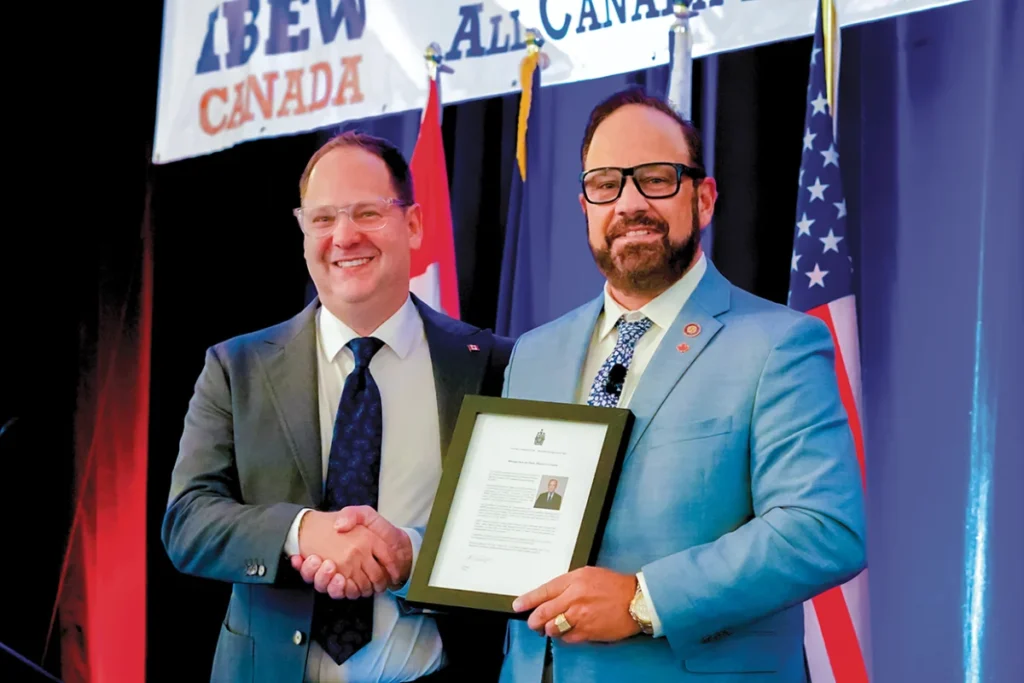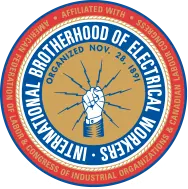
The IBEW earned a major win in Canada when it secured more than $13 million in federal funding for two Brotherhood-affiliated groups.
A total of $10 million will go to the Western Joint Electrical Training Society — a training and facility initiative among three British Columbia local unions: Victoria Local 230, Kamloops Local 993 and Nelson Local 1003.
The National Electrical Trade Council, which assists local unions across Canada with electrical curriculum, training, advocacy and standards, was awarded $3.6 million.
First District International Vice President Russ Shewchuk, who also serves as NETCO’s president, said the funding represents more than just a needed boost for electrical training.
“It’s a true recognition that the Canadian Government recognizes the IBEW as the No. 1 stakeholder in the electrical industry, period,” Shewchuk said. “A lot of people have been trying to move in and chip away at our jurisdiction and our work. We’ve been working to educate people in government that if they want to do anything in the electrical industry, it will come through the IBEW.”
Shewchuk praised the Liberal Government and Prime Minister Mark Carney, who was sworn in in March. The Liberals went on to win the most seats in the federal elections April 28. Carney’s first move as prime minister was cancelling the carbon tax, a move applauded by the IBEW in Canada.
Liberal MP and Secretary of State John Zerucelli announced the training funding at the First District’s Progress Meeting in August. He presented a letter from Carney recognizing the importance of the Brotherhood.
“During dark times, when disaster strikes and disrupts our lives, your members are there for Canadians, to turn lights on and get lives back on track,” the prime minister wrote. “They truly provide indispensable service to our nation.’”
Shewchuk said the ongoing friction with the U.S. over tariffs and their impact on Canadian jobs is forcing the government to explore ways to diversify the nation’s economy and seek out other trading partners.
Much of that — for instance, any investment in green energy — will come through work done by IBEW members, he said. So will investments in the country’s abundant natural resources, such as mining.
“Canada has perhaps the most critical and precious mineral deposits in the world,” Shewchuk said. “We must tap into those mines and facilities to start creating jobs and further expand wealth in the country.”
WJETS Executive Director Adrien Livingston said the funding is a sign that the federal government views the IBEW as a safe partner to work with. WJETS committed to provide a percentage of the training to the Indigenous partners, giving those historically underrepresented citizens a better chance at family-sustaining jobs.
Locals in western Canada also continue to invest heavily in training for solar, wind and battery storage, said Livingston, a former Local 230 training director. He noted that many construction projects now use multiple energy sources.
“People in their house may have an [electric vehicle], a battery bank and solar,” he said. “Having a way to get them to work together efficiently is absolutely crucial.”
NETCO Executive Director Chris Swick said the funding it received will allow utility locals to purchase drones and provide training for members before they are licensed by Transport Canada. NETCO estimates that it will be able to train 350 power linemen over a five-year period.
The funding also ensures that IBEW members are doing the work required by an emerging technology, he said. Drones can increasingly identify downed power lines and unsafe conditions from greater distances, allowing power linemen to perform their work more safely when they arrive on the scene.
“I think this is something you’re going to see quite a bit in the future,” said Swick, a former president of Hamilton, Ontario, Local 105. “There’s a lot of different applications that this technology can be used for in our industry.”
*This article was originally published in the October 2025 issue of The Electrical Worker Online.
